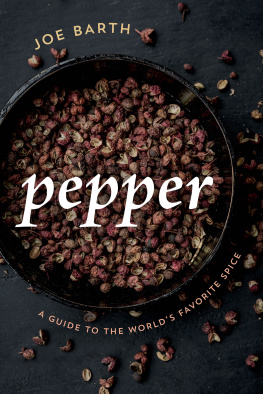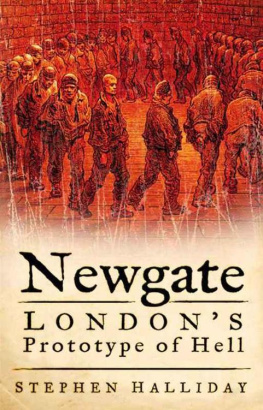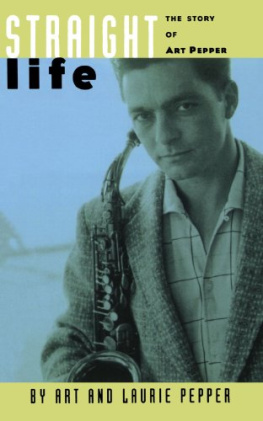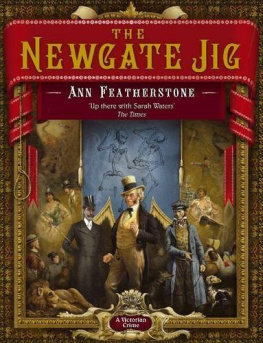Andrew Pepper - The Last Days of Newgate
Here you can read online Andrew Pepper - The Last Days of Newgate full text of the book (entire story) in english for free. Download pdf and epub, get meaning, cover and reviews about this ebook. genre: Detective and thriller. Description of the work, (preface) as well as reviews are available. Best literature library LitArk.com created for fans of good reading and offers a wide selection of genres:
Romance novel
Science fiction
Adventure
Detective
Science
History
Home and family
Prose
Art
Politics
Computer
Non-fiction
Religion
Business
Children
Humor
Choose a favorite category and find really read worthwhile books. Enjoy immersion in the world of imagination, feel the emotions of the characters or learn something new for yourself, make an fascinating discovery.

- Book:The Last Days of Newgate
- Author:
- Genre:
- Rating:5 / 5
- Favourites:Add to favourites
- Your mark:
- 100
- 1
- 2
- 3
- 4
- 5
The Last Days of Newgate: summary, description and annotation
We offer to read an annotation, description, summary or preface (depends on what the author of the book "The Last Days of Newgate" wrote himself). If you haven't found the necessary information about the book — write in the comments, we will try to find it.
The Last Days of Newgate — read online for free the complete book (whole text) full work
Below is the text of the book, divided by pages. System saving the place of the last page read, allows you to conveniently read the book "The Last Days of Newgate" online for free, without having to search again every time where you left off. Put a bookmark, and you can go to the page where you finished reading at any time.
Font size:
Interval:
Bookmark:
Andrew Pepper
The Last Days of Newgate
[T]he gulf between how one should live and how one does live is so wide that a man who neglects what is actually done for what should be done learns the way to self-destruction rather than self-preservation.
NICCOLO MACHIAVELLI, The PrincePART I
London, England
FEBRUARY 1829
ONE
A metallic glint preceded the thrust of a knife blade, as a voice, a female voice, shouted his name.
Pyke.
It may have saved his life.
The blade drew blood on his neck, a nick rather than a wound, and, turning like a whip, he stared into the hate-filled eyes of his attacker. Michael Flynn lunged at him again but this time he swayed backwards and avoided the blades arching loop, steadying himself before taking a grip of the Irishmans wrist and snapping it sideways in a clean jerk that may well have broken bone. Flynns shriek confirmed his pain and, more importantly for Pyke, the knife clattered harmlessly on to the taprooms sawdusted floor. Pyke released his assailants limp wrist and surveyed the mass of hostile faces assembled in the taproom of the Blue Dog tavern. He saw the back of her bonnet, bobbing as she hurried for the door, but she was too far away to be stopped. Later, he could not be sure he had not seen her face as well, but no clear image lodged in his mind. Momentarily he considered going after her, but he had more pressing issues to address. Though wounded, Flynn remained a dangerous adversary and Pyke wasted no time in retrieving the knife from the floor and pressing the blade against the receivers throat. His fee for sending his former associate to certain death on the gallows would be a mere
ten guineas. It would have made practical sense to slit the mans throat in the alley outside the tavern and leave him for the resurrectionists but, whatever else he was, Pyke was not an assassin.
Instead he delivered the papist thief to his Bow Street offices and roughly pushed him into the felons room, ignoring the mans threats to expose him.
It may have seemed incongruous, to some, that, only a few hours later, Pyke was being transported in an open carriage through the manicured grounds of an English aristocrat whose wife had claimed ancestry with the first earl of Essex, but he was neither amused nor unsettled by having to move between different worlds. Nor was he concerned by the inequalities such a difference drew attention to. He would leave such thoughts to the politicians: the blustering Whig aristocrats who spoke about freedom and responsibility in public and abused their servants in private, and Tory landowners who cared nothing about the hardships their wealth and privilege created for others.
Pyke had no time for radical sentiment, nor was he what one might call a monarchist. But he managed to amuse himself, if only for a moment, with the agreeable thought of a mob from the Blue Dog overrunning Lord Edmontons country home and hunting him with scythes and axes.
The carriage, a new, lighter two-wheeled cabriolet, had covered the treacherous terrain from Bow Street and north through Hackney and Homerton in less time than a short-stop stagecoach. Yet it had left him exposed to the elements and Pyke cursed Edmonton for insisting they meet at Hambledon Hall rather than at one of his town houses. That, and the inclement weather, redoubled Pykes determination to charge Edmonton at least twice the figure the old man intended to offer him.
As the afternoon rain began to clear, the old Elizabethan hall became visible, its crenellated stone walls and Gothic, semi-fortified tower reminders of an era long gone. Still, Pyke was disappointed by the distinctly shabby interior. There were none of the excesses that he had been expecting. Lit dimly by gas lamps and candles, the entrance hall had the feel of an empty tomb. Pyke reluctantly allowed one of the servants to take his heavy coat and was informed that Edmonton would be down to greet him in due course. Etiquette demanded that Pyke remain where he was, and so he unhesitatingly made his way through large doors into the Great Hall, an unappealing room cluttered with dark furniture and adorned with a gallery of grim-faced ancestral portraits. Ornately carved wooden brackets held up the heraldic panels of the ceiling. In the distance Pyke heard the soft notes of a piano and followed the sounds through another smaller set of doors, along a corridor and to the threshold of a lounge room warmed by a fire.
From the doorway, and without drawing attention to his presence, he watched Emily Blackwood, Lord Edmontons only progeny. Pyke followed her fingers as they stroked the pianos keys and noted a contradiction between her expression, fixed in concentration, and her body, which moved in time with the rhythm of what she was playing.
She wore an embroidered muslin dress that enhanced her delicate frame. Her dark hair was gathered in a simple comb and offset her pale skin. He admired her fine looks as someone might appreciate a painting by Turner, an object that was pleasing to the eye but ultimately bland. Far better than Turner, for Pyke, was Hogarth, with his scenes of despair and violence. Better still was Hieronymus Bosch; those phantasmagoric images of human suffering made him feel, at once violated and aroused. In short, there was something too virtuous about Emily Blackwood, an element that shone from within her and made her not just unobtainable but somehow too perfect. He wondered whether she might crumble or snap into pieces, should anyone try to fuck her.
Though reluctant to spoil the moment, he feigned a cough. She stopped playing and looked up at him, startled and then angry. They had met once before when he had last performed a service for her father; however, he could not tell whether she recognised him or not. She worked for the philanthropist Elizabeth Fry, a woman of some public esteem, who had long campaigned for improved conditions in Newgate prison.
I would tell you to make yourself at home, but clearly you have already followed such advice, she said, without moving from behind the piano.
You are a very fine pianist. Pyke stepped into the room and ignored her indignation.
You fancy yourself as an expert? she asked, sceptically.
At first, I thought you were playing a piece by Mozart, one of his piano concertos perhaps. But then I considered the way you carried yourself, as though you were trying to hold something back against your will, and it made me revise my opinion.
Her anger abated and a curious expression spread across her face. You presume to know me, and what I played, perhaps a little too well.
Last month, I saw this German fellow, Felix Mendelssohn, give a fine rendition of Beethovens Emperor Concerto in town. What you were playing reminded me a little of him.
Mr Pyke, you are clearly more cultured than your reputation suggests.
Oh? And what does my reputation suggest? He tried to hide his satisfaction that she had remembered his name.
When people talk of you, they do so with a reverence that borders, I would say, on fear.
And you imagine that I seek to encourage such a reputation? Or deserve it? He was wearing a shirt with a collar to hide the cut he had received from Flynns blade.
This time she smiled a little. I would imagine it serves your own interests quite well.
My interests as a thief-taker?
I have heard that only one of those words describes what you are, Mr Pyke. Or what you do.
He couldnt stop himself laughing. He looked at her again, approvingly this time. You seem to know an awful lot about me, Miss Blackwood.
I know youre a Bow Street Runner but I have little idea of what Bow Street Runners are meant to do. I can see youre confident to the point of vulgarity. I would guess your age to be a little over thirty. I have heard other less agreeable rumours about your profession in general which I do not wish to dwell on. Beyond that, I have been blissfully unaware of your existence and intend to remain that way.
Font size:
Interval:
Bookmark:
Similar books «The Last Days of Newgate»
Look at similar books to The Last Days of Newgate. We have selected literature similar in name and meaning in the hope of providing readers with more options to find new, interesting, not yet read works.
Discussion, reviews of the book The Last Days of Newgate and just readers' own opinions. Leave your comments, write what you think about the work, its meaning or the main characters. Specify what exactly you liked and what you didn't like, and why you think so.





